Author Spotlight Interview: Roy M. Griffis
Today’s interview is with multi-genre author, Roy M. Griffis. Griffis writes historical fiction, comic fantasy, alternative history and action-adventure screenplays. We were honored to hear from Griffis about his writing style, what inspires him and his exciting upcoming projects.
HG: How would you describe yourself to somebody who isn’t familiar with your writing yet?
RMG: Savage Satirist, Chronicler of Historical Events that did not take place (but should have), Bon Vivant, Actor, Writer, Hero: truly, a Renaissance Man.
<and, I hope, pretty clearly someone who doesn’t take themselves that seriously. But I am very serious about my ethical responsibility to my readers. That is, to take them on an emotional journey, to remind them that the quality of their lives is in their own hands, to remind them of what is possible, to entertain them, and to write work that is ultimately inspiring, ennobling, and uplifting without being didactic agit-prop. But that’s just me…>
HG: I love that answer! You’ve written historical fiction and comic fantasy. How do you switch gears between projects, genres? Do you have a favorite genre to write in or one that is easiest for you?
RMG: Uh…don’t forget about Alternative History. And my action-adventure screenplays.
But, the question is still valid. The answer is…I write what interests me. Which answer also explains why I don’t have a “real” writing career. I can’t write the same thing over and over again. I, as a writer would find it boring, and things would get stale, fast, for both me and the readers, I think. I’m never gonna be “the guy who writes that 20 book Shape-shifting Sloth Harem series.”
But, as I’ve written more and more novels, a couple of things have become clear me.
1) Every story requires the right “vessel” to undertake the journey. In my case, the question becomes “Would a play be the best way for people to experience this? A screenplay? A short story?” Lately, the answer has been “a novel or novels.”
2) I don’t really start any project unless I have a beginning and an end. I mean, you can’t go on a trip without a destination. Okay, you can, but you’ll take a long damn time to get “anywhere” and probably piss off a few people on the way.
However, once I have that journey in my mind, it becomes very real to me, especially if I’ve already written at least one book about that “trip.” Then it’s not too difficult to step away and go on another excursion. I already know where Holiday Trip #1 is going to end, so why not start a different creative roadtrip that will deliver me and my readers to a different, but one hopes, equally worthy destination. And the whole process starts again…A Beginning with a defined Landing Zone, and laaaaunch to get there.
And when I am doing that, both worlds become very real to me. Since a lot of my writing is essentially taking dictation on what the characters are telling me or just reporting on what I see them do, it becomes rather easy for me to step from one to the other.
Finally, I think it helps me be a better writer, it’s like creative-cross-training. Different novels/series exercise different muscles, if you are willing to do that work. Otherwise, you’re just writing the same book with different character names, and you might as well go back to the “Shape-shifting Sloth Harem.”
HG: That’s really brilliant. What feeling do you want to leave people with when they finish one of your historical fiction novels? Your comic fantasy?
RMG: For any of my books, I want them to have had a good time reading a compelling yarn. I want them to have laughed and gasped, perhaps shed a tear or two, and had their hearts pounding. I want them to have gone on an emotional ride with me; intense without being explicit, compelling without being excessively coarse, graphic without being gross. Of course, for the comic fantasy, I want them to have laughed a lot.
HG: Perfection. Tell us more about what inspired you to write your first novel and why it was important to you.
RMG: First “novel” was a bit more of a Roshamon style, a series of short stories about different characters before and after an attack on the United States. It was interesting and seemed to work for the readers, but not precisely a novel.
The Old World, By the Hands of Men, Book One was my first “real” novel. Like almost anything I’ve ever written, it was born of a question. When hearing or learning about something that people have done or experienced, I tend to ask myself, “Why did that do that?” or “What would have happened if…” or “How come?”
For By the Hands Of Men, I was working on a community theater production of one of my plays, and the set designer, an older English lady, was telling me something she’d heard from her grandfather. He had fought in World War I, and he was telling her the worst thing about being in the trenches was listening to the screaming of the wounded horses and not being able to do anything about it. I thought “How could you sit there hearing that and not try?”
Years later, another random question created a scenario in my mind (no spoilers, it’s the end of the series) and suddenly the two ideas lined up…and I had my journey. At the time, I thought it was going to be one book, but in that I was mistaken…it turned out to be six books (so far) and about 500,000 words.
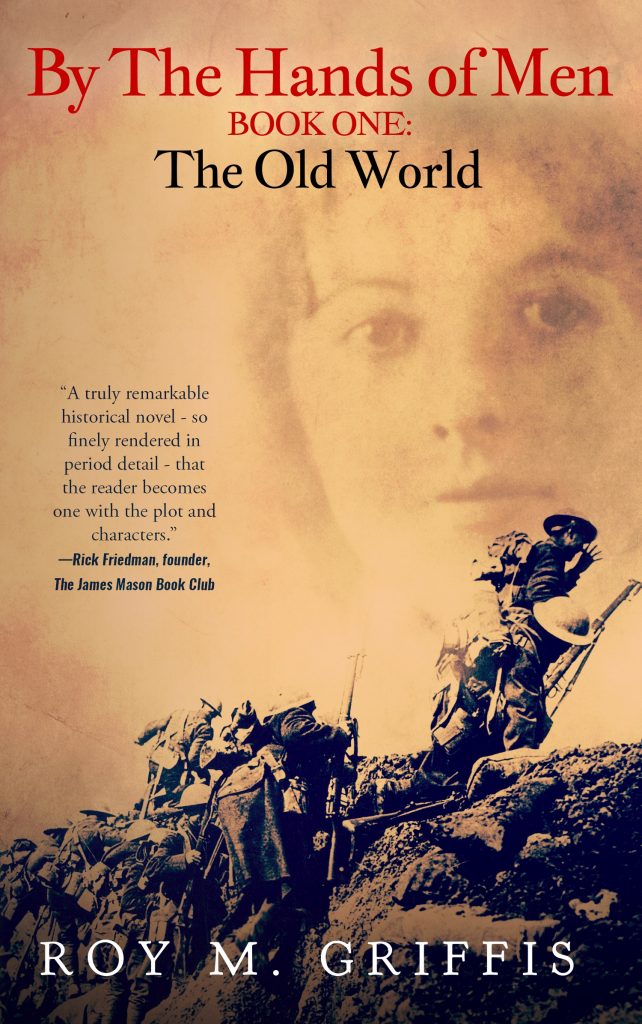
HG: Wow. That’s so interesting. How do you come up with character names?
RMG: A variety of ways. Some of them just have to “feel” right in my ears and imagination. Others are borrowed from history, or are variations on historical names as a homage to some of those folks. Every now and then, I will name a character after someone I’ve known and admired.
What I want to avoid is overly clever names that scream out “CALL BACK,” like putting characters named “Harker” and “Renefield” in a mad-scientist novel, for example.
HG: Makes sense. If By the Hands of Men, Book One: The Old World was made into a movie, who would you cast?
RMG: Great and tough question. Most of the folks I have in mind have aged out of the roles since I first wrote it, but I can go all Hollywood-speak and give you some “-type” names.
- Robert Fitzgerald (male Lead) – “Tom Hiddleston-type”
- Matron – “Maggie Smith-type”
- Orlando – “Pete Postlewaite-type”
But I just recently discovered my Charlotte Braninov, the female lead. She’s a Russian-born actress in a really sweet and funny German movie called “Dream Factory.” Her name is “Emilia Schüle.” She was radiant in Dream Factory.
HG: Wonderful! Switching gears, your latest book The Auditors of Doom released in February. Can you tell us a little bit about the main characters and what readers will love about this story?
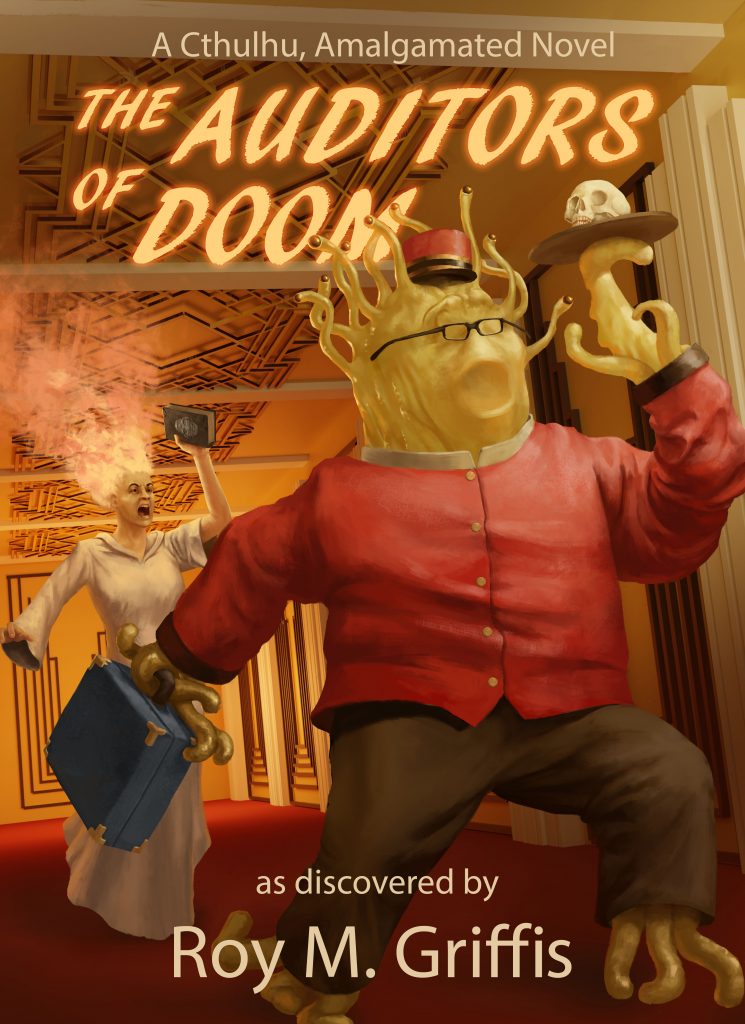
RMG: Man, you ask the tough questions. Okay, AOD is Book Two in my Cthulhu, Amalgamated series.
There is an entire fictional universe based on the Cthulhu stories by H. P. Lovecraft, which he wrote beginning in about 1910. In the years since HP created it, people have run with it, adding to it, building on what’s called the Cthulhu mythos. It’s this dark and nihilist fantasy universe, very gothic and brooding in their own way, about these beings that are outside of time and space, predating our reality in a way, known variously as “Old Gods,” “Elder Things,” “The Lurkers in the Darkness” and a variety of other reasonably unhinged terms. They keep wanting to get our Earth, for some reason, and anyone who encounters them tends to end up dead or insane.
Yeah, a lot of laughs there.
Anyway, to pay the bills, I work a corporate job to pay the mortgage and keep myself from being a burden to society. And in TLDR way, it occurred to me that every organization (large and small) has some kind of support staff. You know, people who buy the office supplies, write the checks, take care of payroll and all that. Even an organization like Cthulhu, Amalgamated.
I figured it couldn’t be an easy gig, what with all the “Shamblers In the Shadows Of Madmen’s Minds” and “The Blithering Excrescence From Beyond the Stars” hanging around. And what would it be like to be really low on that totem pole, and worse, maybe the nephew of one of the “Elder Dark Things”? But I’m a big believer in choice and free will. I think too often folks do what they think they are expected to do. And maybe some of these guys aren’t bad, they just think they have to be.
Book One (The Thing from HR) is the story of our nephew-hero Narg, who is the manager of the very unimportant HR department. But, because he has a minor in Human Studies, his Uncle (the aforementioned “Blithering Excrescence”) sends Narg on a little mission for him. To earth. Down among the hairless apes.
I don’t want to say too much about the story and be that spoiler-guy, but The Auditors of Doom continues the adventures of Narg as he tries to figure out what tom-foolery those clever Hairless Apes are up to this time.
I’m revising book three (The Breakroom of a Thousand Nightmares) now and hope to release it soon.
I think what readers will love is Narg himself. He’s like a lot of us, insecure in his abilities, pretending to be something he’s not to get along, but recognizing there is more to his world…more to him…than he can currently grasp. He has to figure out if a Bad Thing can be a Good Guy.
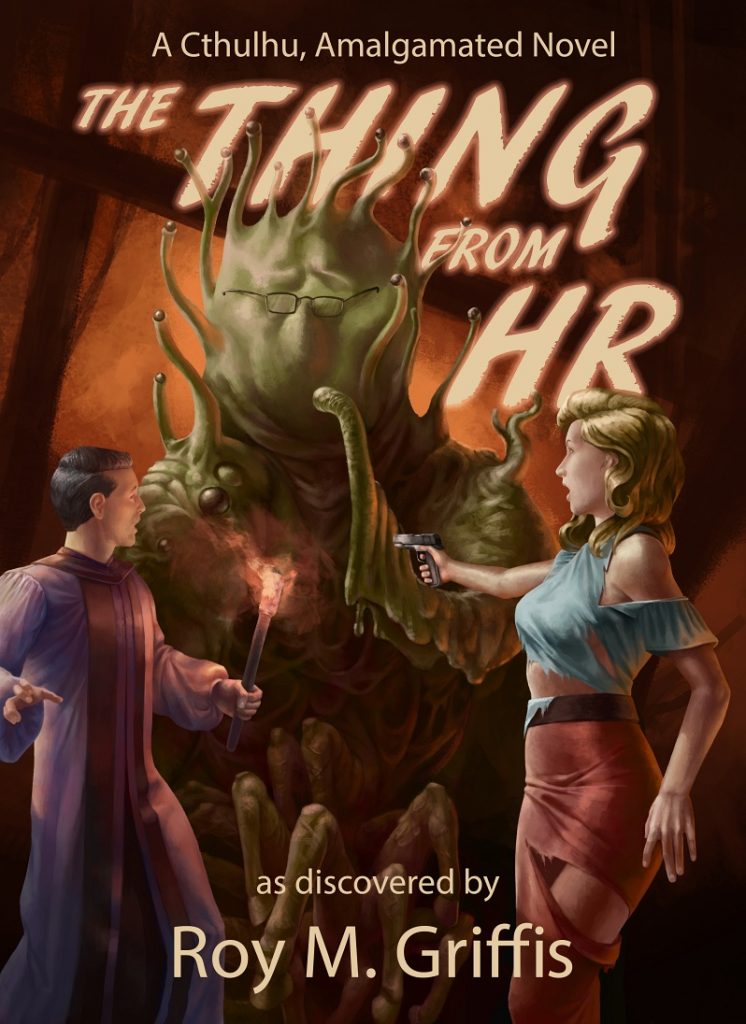
HG: That’s such an awesome concept. Tell us a little bit about your actual writing process. When and where do you write?
RMG: I guess for me, it’s more like “process” and “production.”
For a play/screenplay, the output is so format dependent, I need to plan the whole thing out ahead of time. For a full-length screenplay, I’ll write what amounts to about a 20 page, single spaced “short story” (a treatment, in the lingo). It works out all the major action, reversals, important scenes, plot and climax. Something similar will be done with a play.
With a novel or a short story, however, I can just go wild (as long as I have that beginning and that end in mind). That’s the “process.”
The production part goes like this. Get up early, between 4am – 4:30. Feed the cat. Make some coffee…go into my office, turn on the PC, and get to work. Monday – Friday, I try to get in about two hours writing before real life shows up and starts looking at its watch. Saturday and Sundays, I’ll try to get in a couple of hours before church or around yard work and chores or bike rides with my wife or son.
In the end, it’s whatever works for you, though. I’ve written in all kinds of places…even with a typewriter on my lap in the middle of the night in a dimly lit galley on a Coast Guard patrol boat. But once I grew up (married, father/step-father), regular hours became more required if I wanted to get anything done. Also it was an energy question. I discovered that after an 8 hour day and over two hours on the road, plus the need to be a good father and play with my kid, I had nothing left to write with at the end of the day. So, pre-dawn it was.
HG: Sounds like you have a system that works for you! Do you listen to music while you write? If so, what’s on your playlist?
RMG: Music is required. I have all kinds of stuff on my playlist: classical, folk, pop, a little disco, country, and movie soundtrack music. I like music that is either emotive (“Gladiator” and “Lord of the Rings” soundtracks, for instance) or that tells a story in an interesting way lyrically or musically (e.g. “Dracula from Houston” by the unfortunately named Butthole Surfers, or “Sentimental Hygiene” by the late Warren Zevon). I am NOT interested in songs that bemoan the fate of the singer due to their own stupid choices (that eliminates a lot of blues songs and a good chunk of country, alas). Right now, the Weather Girls are knocking “It’s Raining Men” out of the park.
HG: Awesome! Do you have any interesting writing quirks?
RMG: Coffee, or it ain’t happening. (but it can even in the face of its absence).
Also, for my novels, I’ve discovered I like to set myself a writing challenge.
With By the Hands of Men, I decided I wanted to compose the book as if it had been written at the time of the events of the story. That is, treat it like the biography of the characters published when it all went down. That meant writing in the tone and style of the times, which affected word choice, sentence structure, how graphic my descriptions of war could be, the kinds of language the characters would use, and so on. It translated to, basically, no skin, no boinking, and almost no cursing unless it was the most refined sort.
For Cthulhu, Amalgamated, there was less of a specific “challenge,” but one was certainly forced on me by the subject and plot. I had to take an alien and make his reactions to and perceptions of human behavior reasonably “wrong,” yet still give enough clues that the reader would understand (and maybe even laugh) at the errors our hero was making. That turned out to be easier than I expected, all I had to do was channel my inner autistic child’s lack of understanding of social mores and cues, and it practically wrote itself.
HG: Love the concept of different personal writing challenges for each novel. What do you like to do when not writing?
RMG: I like to do Community Theatre, with my 28-year-old son and my wife, if possible.
We enjoy riding bikes around East Texas. Go to movies, and visiting historic sites and older towns, learning about their past. I also like to hang out with my son and watch bad television shows, along with gems when we can find them.
I don’t “enjoy” but I do take satisfaction from tending to our 1.7 acres, keeping it from returning to the primordial jungle from when it sprang. And playing with the rescue critters, one cat and two dogs.
I’m not reading as much as I once did…it’s either research or I’m avoiding stuff I enjoy so it doesn’t accidentally leech into what I’m working on at the time.
HG: That’s great. Now, if you could ask your author idol one question about their writing, writing process, or books, what would it be?
RMG: Gosh…which “idol”? In non-fiction or fiction?
I think it would be: “What was the most satisfying part of writing all those books?”
For me, I’ve found out that while I make a few bucks doing this, it’s not “go to Hollywood and have starlets rub coconut oil on my bald-spot money.”
But what is really cool are the contacts with readers. The stories they tell me, and the kind words when they share the experience of going on those journeys with me. It’s a real kick to hear I made someone cry (in a good way) or that they compared my work to both Terry Pratchett and Mel Brooks. That’s all high praise, indeed.
HG: That’s really inspiring. Before we wrap up, what can you tell us about any projects you have in the works?
RMG: Again with the hard questions!
- My alternative history series, The Lonesome George Chronicles, is being re-released this summer. Book 4 in that series if there is an audience for it.
- By the Hands Of Men Book 7 started by end of summer, I hope.
- A three book Paranormal Adventure series, which I’ve started and is overdue.
- A five book off-beat cozy mystery series.
- A stand alone horror novel that will tie into both series.
- Kicking around an idea about a kind of afterlife training school.
- There’s one full-length play I want to write, but I have to get the rights to the subject matter.
- Plus, I have some other ideas for Cthulhu, Amalgamated.
That’s about it, off the top of my head.
HG: You’re busy! For readers that want to find out more about your stories and keep up with you, where should they go to connect or learn more?
Best bet is: Roymgriffis.com
Or Facebook: Roy M. Griffis – Storyteller
If you love to read and leave reviews on Amazon, and would like to get books from authors like Roy M. Griffis for free every day, then sign up for the Hidden Gems ARC program. Each day we send out emails with offers of free books in over 15 different genres, and you’ll only be sent the genres you’re interested in and the books you want to read. Sign up for as many or as few as you have time and interest for, we’ll keep the eBooks flowing as long as you want to keep on reading and reviewing!



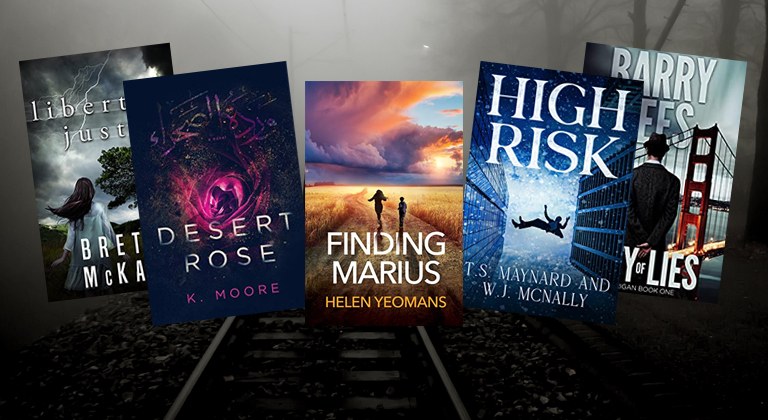



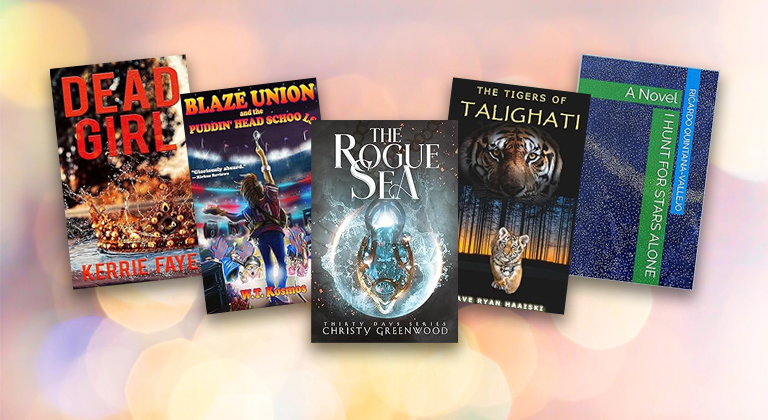

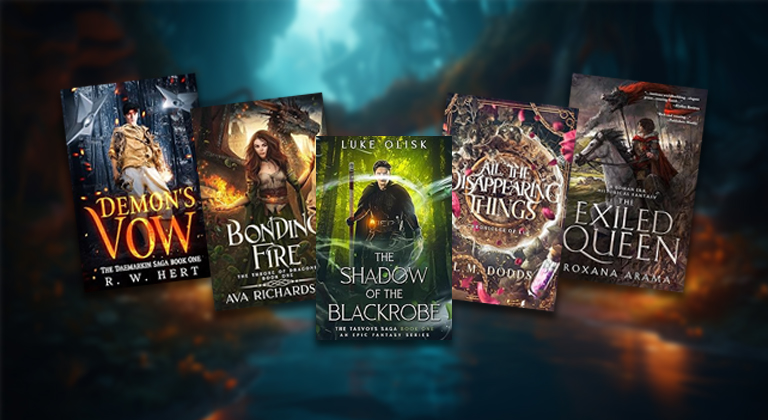

1 Comments